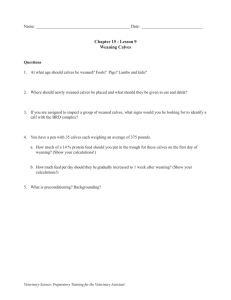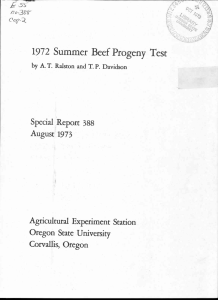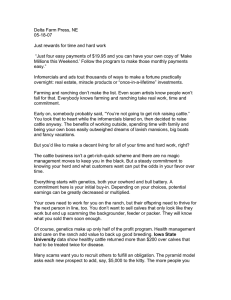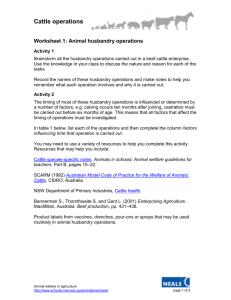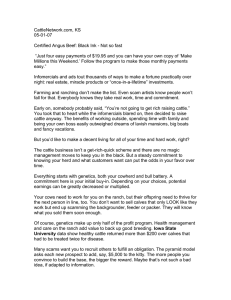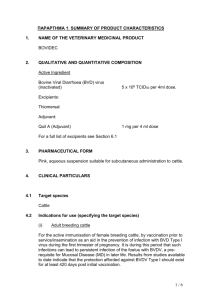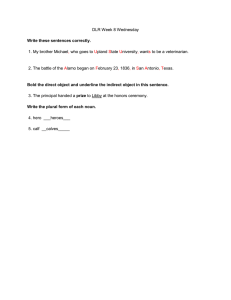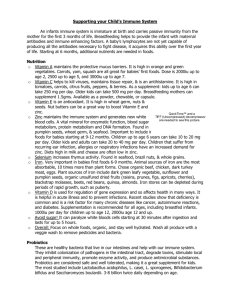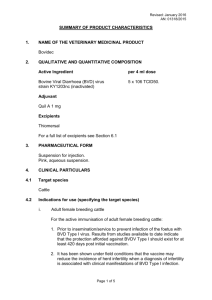Nutritional Effects on Vaccination Response
advertisement
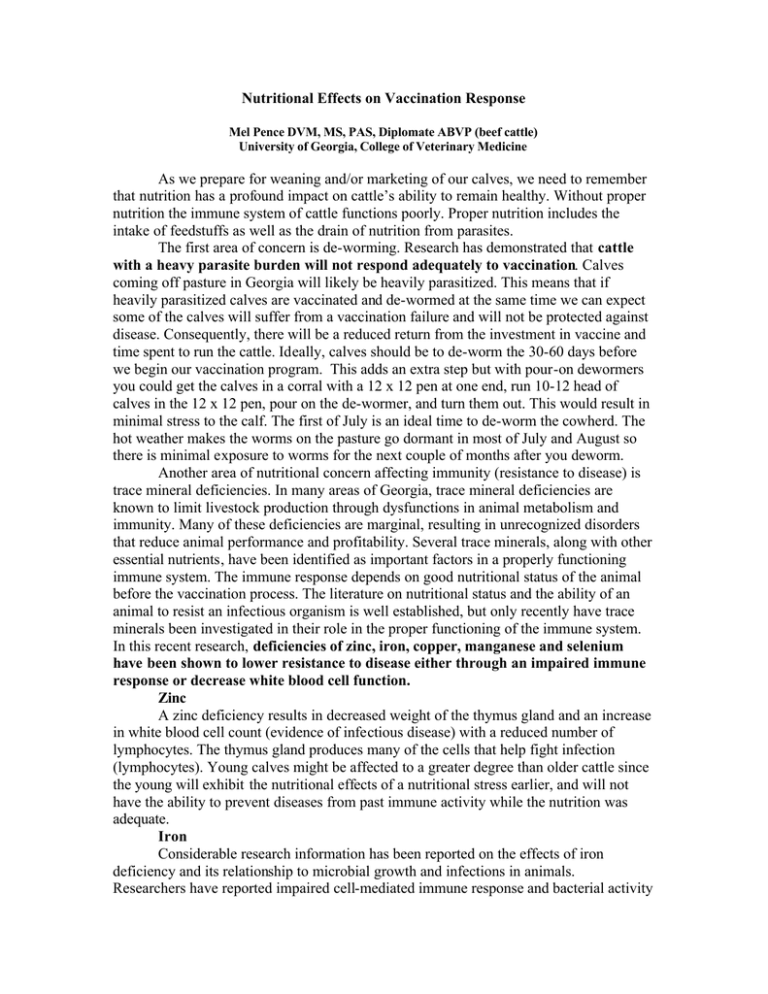
Nutritional Effects on Vaccination Response Mel Pence DVM, MS, PAS, Diplomate ABVP (beef cattle) University of Georgia, College of Veterinary Medicine As we prepare for weaning and/or marketing of our calves, we need to remember that nutrition has a profound impact on cattle’s ability to remain healthy. Without proper nutrition the immune system of cattle functions poorly. Proper nutrition includes the intake of feedstuffs as well as the drain of nutrition from parasites. The first area of concern is de-worming. Research has demonstrated that cattle with a heavy parasite burden will not respond adequately to vaccination. Calves coming off pasture in Georgia will likely be heavily parasitized. This means that if heavily parasitized calves are vaccinated and de-wormed at the same time we can expect some of the calves will suffer from a vaccination failure and will not be protected against disease. Consequently, there will be a reduced return from the investment in vaccine and time spent to run the cattle. Ideally, calves should be to de-worm the 30-60 days before we begin our vaccination program. This adds an extra step but with pour-on dewormers you could get the calves in a corral with a 12 x 12 pen at one end, run 10-12 head of calves in the 12 x 12 pen, pour on the de-wormer, and turn them out. This would result in minimal stress to the calf. The first of July is an ideal time to de-worm the cowherd. The hot weather makes the worms on the pasture go dormant in most of July and August so there is minimal exposure to worms for the next couple of months after you deworm. Another area of nutritional concern affecting immunity (resistance to disease) is trace mineral deficiencies. In many areas of Georgia, trace mineral deficiencies are known to limit livestock production through dysfunctions in animal metabolism and immunity. Many of these deficiencies are marginal, resulting in unrecognized disorders that reduce animal performance and profitability. Several trace minerals, along with other essential nutrients, have been identified as important factors in a properly functioning immune system. The immune response depends on good nutritional status of the animal before the vaccination process. The literature on nutritional status and the ability of an animal to resist an infectious organism is well established, but only recently have trace minerals been investigated in their role in the proper functioning of the immune system. In this recent research, deficiencies of zinc, iron, copper, manganese and selenium have been shown to lower resistance to disease either through an impaired immune response or decrease white blood cell function. Zinc A zinc deficiency results in decreased weight of the thymus gland and an increase in white blood cell count (evidence of infectious disease) with a reduced number of lymphocytes. The thymus gland produces many of the cells that help fight infection (lymphocytes). Young calves might be affected to a greater degree than older cattle since the young will exhibit the nutritional effects of a nutritional stress earlier, and will not have the ability to prevent diseases from past immune activity while the nutrition was adequate. Iron Considerable research information has been reported on the effects of iron deficiency and its relationship to microbial growth and infections in animals. Researchers have reported impaired cell-mediated immune response and bacterial activity of leukocytes in children with low blood iron (hemoglobin) levels. Some reports suggest low transferrin saturation (a blood-iron transport protein) may be a primary defense mechanism against infection. The iron dependent transport proteins (serum transferrin, lactoferrin, and ovotransferrin) have been found to inhibit microbial growth. Selenium Selenium deficiency reduces immune responses, an effect that is magnified when there is also a vitamin E deficiency. Numerous studies have linked selenium status to immunocompetence. Both vitamin E and selenium independently enhanced the immune response of calves. Selenium also acts to reduce the incidence and duration of clinical mastitis in dairy cattle. This action may be observed by a reduction of somatic cell counts in milk, which will increase milk quality when dietary selenium is adequate. Some of this activity may be associated with the action of vitamin E. However, selenium alone reduced the duration of clinical symptoms of mastitis by 46 percent and vitamin E alone reduced duration of the symptoms by 44 per-cent. In combination, selenium and vitamin E reduced the duration of symptoms by 62 percent. Copper Copper-deficient animals exhibit several symptoms of immune system dysfunctions. These include an absolute decrease in the number of white blood cells. Copper-deficient animals show a decrease in antibody-cell response with increased susceptibility to infection. Marginal copper deficiency in the ewe’s diet causes a marked increase in lamb mortality, particularly associated with infectious diseases. Copper has been hypothesized to play an important role in the defense of an organism against metabolic, neoplastic, infectious, inflammatory, and other forms of stress. Summary A well-coordinated nutrition, health care, and management program is required to maximize efficiency and productivity. The higher the productivity level in a herd, the higher are the nutritional, health, and management requirements for the animals. Animals fed properly are more resistant to many bacterial and parasitic infections. When proper nutritional programs are implemented, greater animal productivity can be attained, with the potential of increased profits. So, how do we use this information to improve our calves response to vaccination? It is important to get adequate levels of trace minerals into the calves before vaccination. This can most effectively be accomplished by using a trace mineralized salt and mineral mix. Your county extension agent should be able to assist you in developing a trace mineral program. Trace mineral deficiencies and parasite load will decrease the effectiveness of your vaccination programs.
